Evaluation and Recommendations: Health and Social Care Partnership
VerifiedAdded on 2020/01/28
|7
|2175
|153
Report
AI Summary
This report provides a comprehensive analysis of partnership working in the health and social care (HSC) sector, with a specific focus on the Royal London Hospital in the UK. It begins by exploring the core philosophies underpinning HSC, such as respect, power sharing, informed choices, independence, and empowerment, emphasizing their importance in resolving ethical dilemmas. The report then details different models of partnership working, including coordinated, unified, and coalition models, as well as practical models for local healthcare partnerships. An evaluation of partnership working is presented, considering the impact of legal policies like the Equality Act 2010, Mental Capacity Act 2005, and the Care Quality Commission (CQC), as well as organizational practices. The report concludes with recommendations for improving partnership working at the Royal London Hospital, focusing on information sharing, risk assessment, issue resolution, and communication strategies to enhance service quality for service users. The report references several books, journals, and online resources to support its findings.
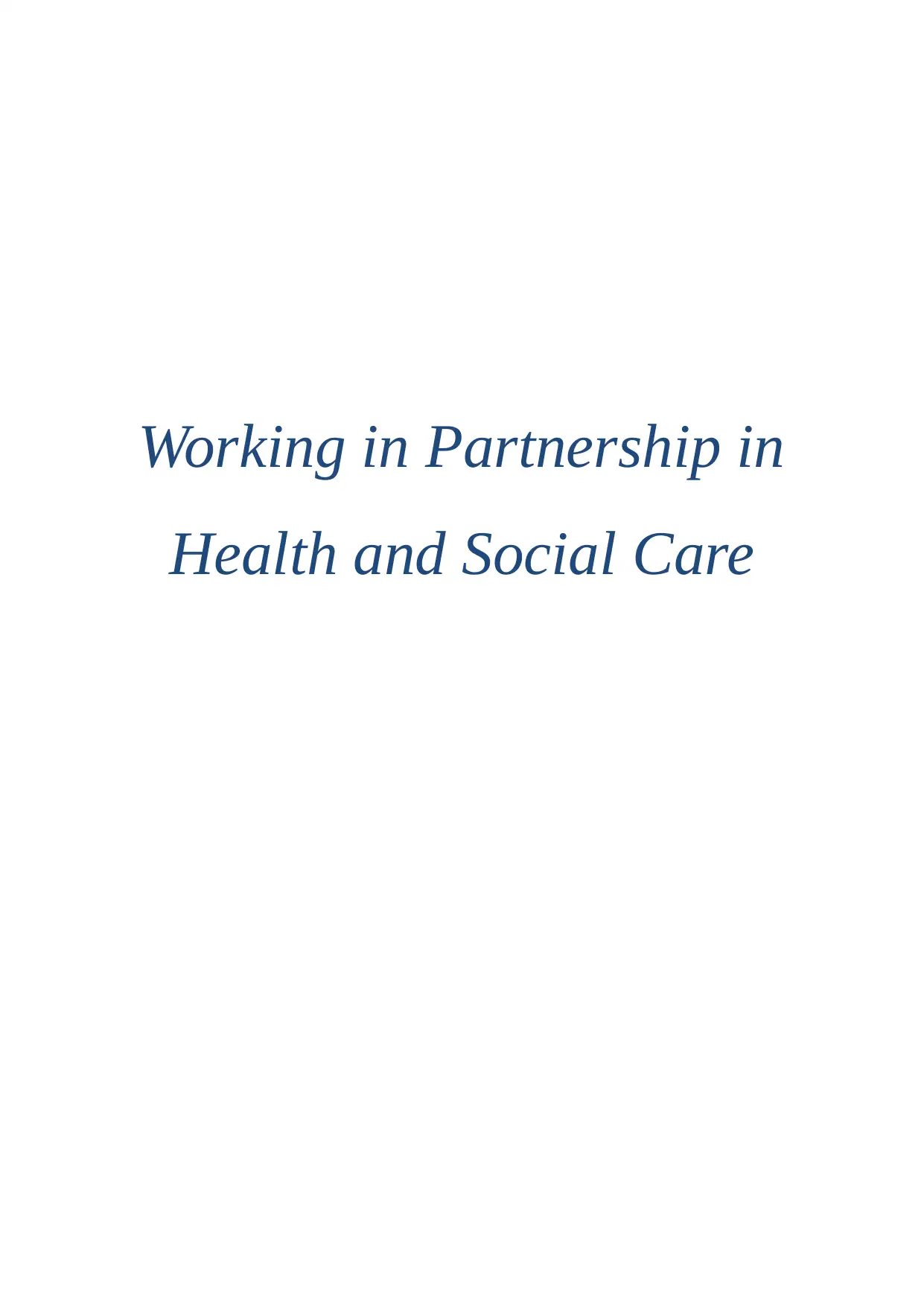
Working in Partnership in
Health and Social Care
Health and Social Care
Paraphrase This Document
Need a fresh take? Get an instant paraphrase of this document with our AI Paraphraser

Table of Contents
Introduction .........................................................................................................................................3
Philosophy............................................................................................................................................3
Partnership and philosophies in health and social care........................................................................3
Different types of working in partnership............................................................................................4
Evaluation of partnership working.......................................................................................................5
recommendations..................................................................................................................................6
Conclusion ...........................................................................................................................................6
References ...........................................................................................................................................7
Introduction .........................................................................................................................................3
Philosophy............................................................................................................................................3
Partnership and philosophies in health and social care........................................................................3
Different types of working in partnership............................................................................................4
Evaluation of partnership working.......................................................................................................5
recommendations..................................................................................................................................6
Conclusion ...........................................................................................................................................6
References ...........................................................................................................................................7
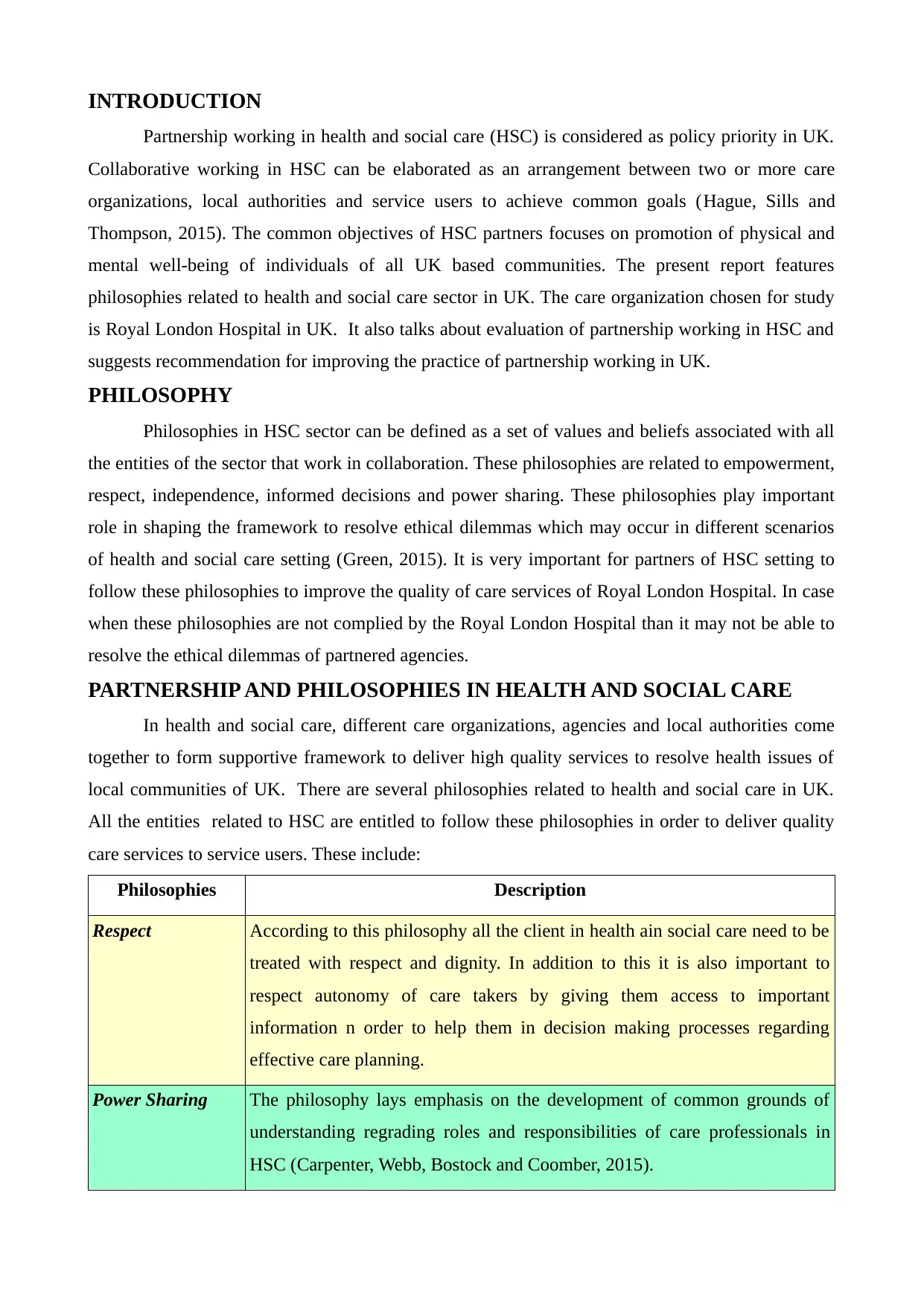
INTRODUCTION
Partnership working in health and social care (HSC) is considered as policy priority in UK.
Collaborative working in HSC can be elaborated as an arrangement between two or more care
organizations, local authorities and service users to achieve common goals (Hague, Sills and
Thompson, 2015). The common objectives of HSC partners focuses on promotion of physical and
mental well-being of individuals of all UK based communities. The present report features
philosophies related to health and social care sector in UK. The care organization chosen for study
is Royal London Hospital in UK. It also talks about evaluation of partnership working in HSC and
suggests recommendation for improving the practice of partnership working in UK.
PHILOSOPHY
Philosophies in HSC sector can be defined as a set of values and beliefs associated with all
the entities of the sector that work in collaboration. These philosophies are related to empowerment,
respect, independence, informed decisions and power sharing. These philosophies play important
role in shaping the framework to resolve ethical dilemmas which may occur in different scenarios
of health and social care setting (Green, 2015). It is very important for partners of HSC setting to
follow these philosophies to improve the quality of care services of Royal London Hospital. In case
when these philosophies are not complied by the Royal London Hospital than it may not be able to
resolve the ethical dilemmas of partnered agencies.
PARTNERSHIP AND PHILOSOPHIES IN HEALTH AND SOCIAL CARE
In health and social care, different care organizations, agencies and local authorities come
together to form supportive framework to deliver high quality services to resolve health issues of
local communities of UK. There are several philosophies related to health and social care in UK.
All the entities related to HSC are entitled to follow these philosophies in order to deliver quality
care services to service users. These include:
Philosophies Description
Respect According to this philosophy all the client in health ain social care need to be
treated with respect and dignity. In addition to this it is also important to
respect autonomy of care takers by giving them access to important
information n order to help them in decision making processes regarding
effective care planning.
Power Sharing The philosophy lays emphasis on the development of common grounds of
understanding regrading roles and responsibilities of care professionals in
HSC (Carpenter, Webb, Bostock and Coomber, 2015).
Partnership working in health and social care (HSC) is considered as policy priority in UK.
Collaborative working in HSC can be elaborated as an arrangement between two or more care
organizations, local authorities and service users to achieve common goals (Hague, Sills and
Thompson, 2015). The common objectives of HSC partners focuses on promotion of physical and
mental well-being of individuals of all UK based communities. The present report features
philosophies related to health and social care sector in UK. The care organization chosen for study
is Royal London Hospital in UK. It also talks about evaluation of partnership working in HSC and
suggests recommendation for improving the practice of partnership working in UK.
PHILOSOPHY
Philosophies in HSC sector can be defined as a set of values and beliefs associated with all
the entities of the sector that work in collaboration. These philosophies are related to empowerment,
respect, independence, informed decisions and power sharing. These philosophies play important
role in shaping the framework to resolve ethical dilemmas which may occur in different scenarios
of health and social care setting (Green, 2015). It is very important for partners of HSC setting to
follow these philosophies to improve the quality of care services of Royal London Hospital. In case
when these philosophies are not complied by the Royal London Hospital than it may not be able to
resolve the ethical dilemmas of partnered agencies.
PARTNERSHIP AND PHILOSOPHIES IN HEALTH AND SOCIAL CARE
In health and social care, different care organizations, agencies and local authorities come
together to form supportive framework to deliver high quality services to resolve health issues of
local communities of UK. There are several philosophies related to health and social care in UK.
All the entities related to HSC are entitled to follow these philosophies in order to deliver quality
care services to service users. These include:
Philosophies Description
Respect According to this philosophy all the client in health ain social care need to be
treated with respect and dignity. In addition to this it is also important to
respect autonomy of care takers by giving them access to important
information n order to help them in decision making processes regarding
effective care planning.
Power Sharing The philosophy lays emphasis on the development of common grounds of
understanding regrading roles and responsibilities of care professionals in
HSC (Carpenter, Webb, Bostock and Coomber, 2015).
⊘ This is a preview!⊘
Do you want full access?
Subscribe today to unlock all pages.

Trusted by 1+ million students worldwide
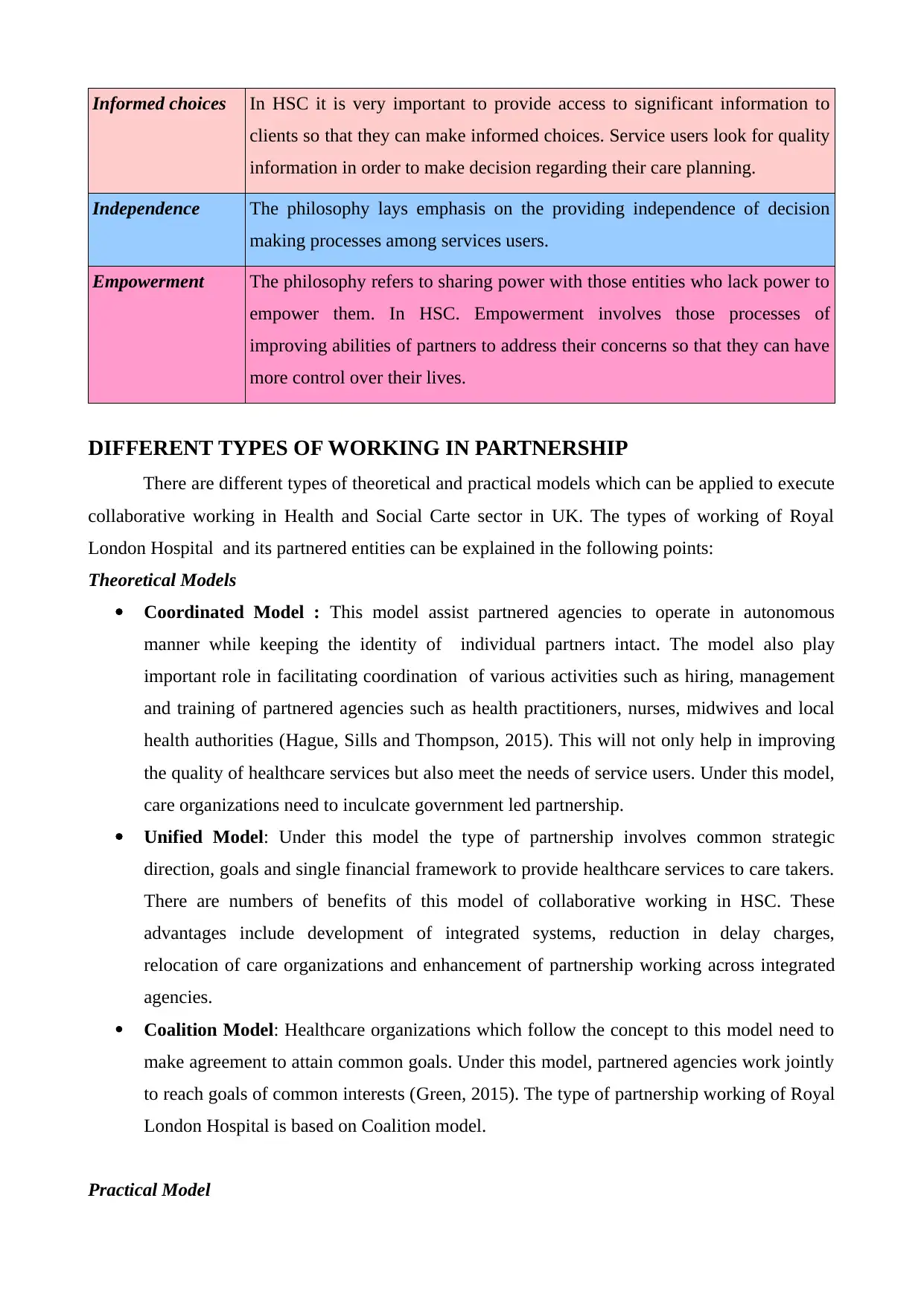
Informed choices In HSC it is very important to provide access to significant information to
clients so that they can make informed choices. Service users look for quality
information in order to make decision regarding their care planning.
Independence The philosophy lays emphasis on the providing independence of decision
making processes among services users.
Empowerment The philosophy refers to sharing power with those entities who lack power to
empower them. In HSC. Empowerment involves those processes of
improving abilities of partners to address their concerns so that they can have
more control over their lives.
DIFFERENT TYPES OF WORKING IN PARTNERSHIP
There are different types of theoretical and practical models which can be applied to execute
collaborative working in Health and Social Carte sector in UK. The types of working of Royal
London Hospital and its partnered entities can be explained in the following points:
Theoretical Models
Coordinated Model : This model assist partnered agencies to operate in autonomous
manner while keeping the identity of individual partners intact. The model also play
important role in facilitating coordination of various activities such as hiring, management
and training of partnered agencies such as health practitioners, nurses, midwives and local
health authorities (Hague, Sills and Thompson, 2015). This will not only help in improving
the quality of healthcare services but also meet the needs of service users. Under this model,
care organizations need to inculcate government led partnership.
Unified Model: Under this model the type of partnership involves common strategic
direction, goals and single financial framework to provide healthcare services to care takers.
There are numbers of benefits of this model of collaborative working in HSC. These
advantages include development of integrated systems, reduction in delay charges,
relocation of care organizations and enhancement of partnership working across integrated
agencies.
Coalition Model: Healthcare organizations which follow the concept to this model need to
make agreement to attain common goals. Under this model, partnered agencies work jointly
to reach goals of common interests (Green, 2015). The type of partnership working of Royal
London Hospital is based on Coalition model.
Practical Model
clients so that they can make informed choices. Service users look for quality
information in order to make decision regarding their care planning.
Independence The philosophy lays emphasis on the providing independence of decision
making processes among services users.
Empowerment The philosophy refers to sharing power with those entities who lack power to
empower them. In HSC. Empowerment involves those processes of
improving abilities of partners to address their concerns so that they can have
more control over their lives.
DIFFERENT TYPES OF WORKING IN PARTNERSHIP
There are different types of theoretical and practical models which can be applied to execute
collaborative working in Health and Social Carte sector in UK. The types of working of Royal
London Hospital and its partnered entities can be explained in the following points:
Theoretical Models
Coordinated Model : This model assist partnered agencies to operate in autonomous
manner while keeping the identity of individual partners intact. The model also play
important role in facilitating coordination of various activities such as hiring, management
and training of partnered agencies such as health practitioners, nurses, midwives and local
health authorities (Hague, Sills and Thompson, 2015). This will not only help in improving
the quality of healthcare services but also meet the needs of service users. Under this model,
care organizations need to inculcate government led partnership.
Unified Model: Under this model the type of partnership involves common strategic
direction, goals and single financial framework to provide healthcare services to care takers.
There are numbers of benefits of this model of collaborative working in HSC. These
advantages include development of integrated systems, reduction in delay charges,
relocation of care organizations and enhancement of partnership working across integrated
agencies.
Coalition Model: Healthcare organizations which follow the concept to this model need to
make agreement to attain common goals. Under this model, partnered agencies work jointly
to reach goals of common interests (Green, 2015). The type of partnership working of Royal
London Hospital is based on Coalition model.
Practical Model
Paraphrase This Document
Need a fresh take? Get an instant paraphrase of this document with our AI Paraphraser
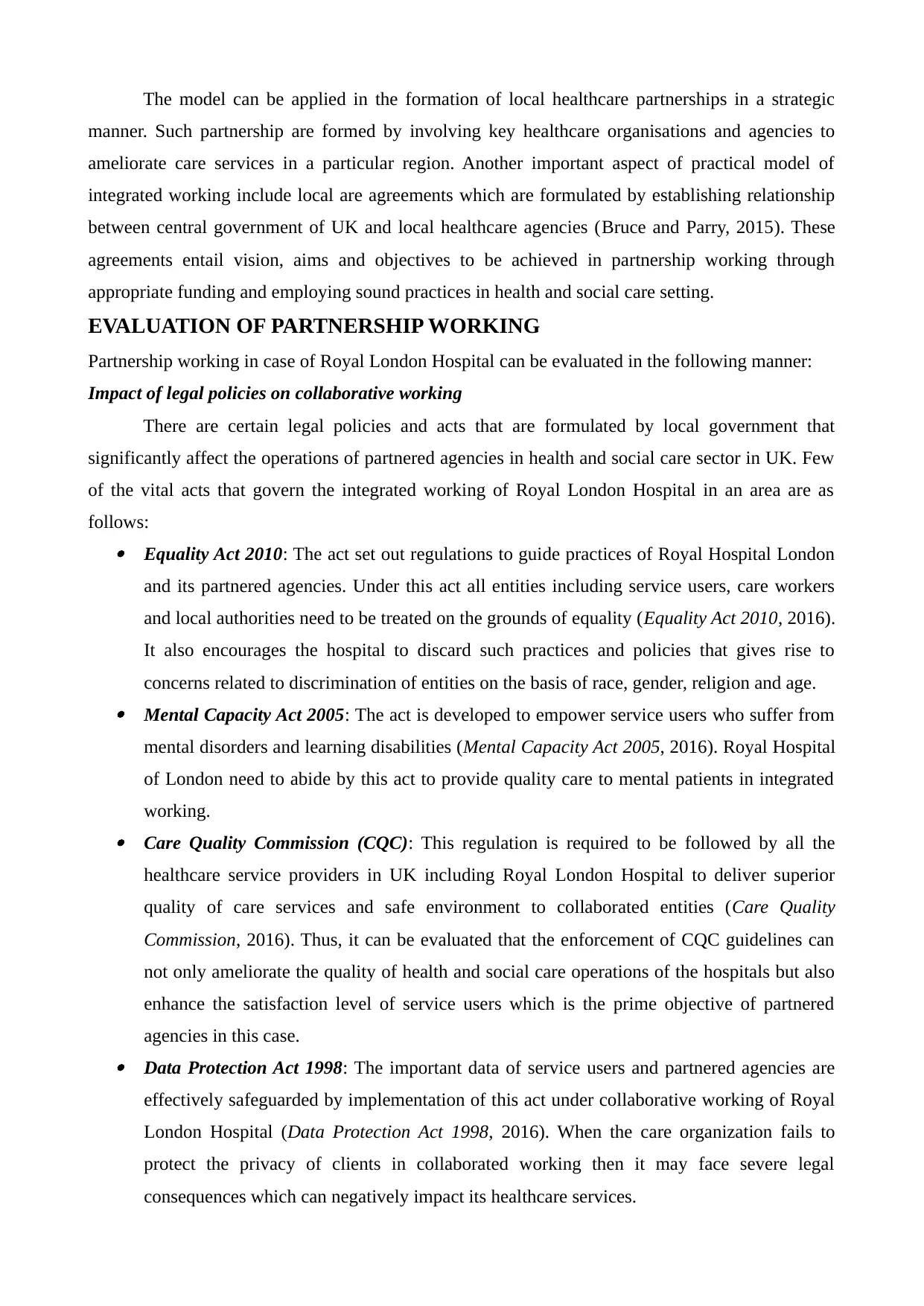
The model can be applied in the formation of local healthcare partnerships in a strategic
manner. Such partnership are formed by involving key healthcare organisations and agencies to
ameliorate care services in a particular region. Another important aspect of practical model of
integrated working include local are agreements which are formulated by establishing relationship
between central government of UK and local healthcare agencies (Bruce and Parry, 2015). These
agreements entail vision, aims and objectives to be achieved in partnership working through
appropriate funding and employing sound practices in health and social care setting.
EVALUATION OF PARTNERSHIP WORKING
Partnership working in case of Royal London Hospital can be evaluated in the following manner:
Impact of legal policies on collaborative working
There are certain legal policies and acts that are formulated by local government that
significantly affect the operations of partnered agencies in health and social care sector in UK. Few
of the vital acts that govern the integrated working of Royal London Hospital in an area are as
follows: Equality Act 2010: The act set out regulations to guide practices of Royal Hospital London
and its partnered agencies. Under this act all entities including service users, care workers
and local authorities need to be treated on the grounds of equality (Equality Act 2010, 2016).
It also encourages the hospital to discard such practices and policies that gives rise to
concerns related to discrimination of entities on the basis of race, gender, religion and age. Mental Capacity Act 2005: The act is developed to empower service users who suffer from
mental disorders and learning disabilities (Mental Capacity Act 2005, 2016). Royal Hospital
of London need to abide by this act to provide quality care to mental patients in integrated
working. Care Quality Commission (CQC): This regulation is required to be followed by all the
healthcare service providers in UK including Royal London Hospital to deliver superior
quality of care services and safe environment to collaborated entities (Care Quality
Commission, 2016). Thus, it can be evaluated that the enforcement of CQC guidelines can
not only ameliorate the quality of health and social care operations of the hospitals but also
enhance the satisfaction level of service users which is the prime objective of partnered
agencies in this case. Data Protection Act 1998: The important data of service users and partnered agencies are
effectively safeguarded by implementation of this act under collaborative working of Royal
London Hospital (Data Protection Act 1998, 2016). When the care organization fails to
protect the privacy of clients in collaborated working then it may face severe legal
consequences which can negatively impact its healthcare services.
manner. Such partnership are formed by involving key healthcare organisations and agencies to
ameliorate care services in a particular region. Another important aspect of practical model of
integrated working include local are agreements which are formulated by establishing relationship
between central government of UK and local healthcare agencies (Bruce and Parry, 2015). These
agreements entail vision, aims and objectives to be achieved in partnership working through
appropriate funding and employing sound practices in health and social care setting.
EVALUATION OF PARTNERSHIP WORKING
Partnership working in case of Royal London Hospital can be evaluated in the following manner:
Impact of legal policies on collaborative working
There are certain legal policies and acts that are formulated by local government that
significantly affect the operations of partnered agencies in health and social care sector in UK. Few
of the vital acts that govern the integrated working of Royal London Hospital in an area are as
follows: Equality Act 2010: The act set out regulations to guide practices of Royal Hospital London
and its partnered agencies. Under this act all entities including service users, care workers
and local authorities need to be treated on the grounds of equality (Equality Act 2010, 2016).
It also encourages the hospital to discard such practices and policies that gives rise to
concerns related to discrimination of entities on the basis of race, gender, religion and age. Mental Capacity Act 2005: The act is developed to empower service users who suffer from
mental disorders and learning disabilities (Mental Capacity Act 2005, 2016). Royal Hospital
of London need to abide by this act to provide quality care to mental patients in integrated
working. Care Quality Commission (CQC): This regulation is required to be followed by all the
healthcare service providers in UK including Royal London Hospital to deliver superior
quality of care services and safe environment to collaborated entities (Care Quality
Commission, 2016). Thus, it can be evaluated that the enforcement of CQC guidelines can
not only ameliorate the quality of health and social care operations of the hospitals but also
enhance the satisfaction level of service users which is the prime objective of partnered
agencies in this case. Data Protection Act 1998: The important data of service users and partnered agencies are
effectively safeguarded by implementation of this act under collaborative working of Royal
London Hospital (Data Protection Act 1998, 2016). When the care organization fails to
protect the privacy of clients in collaborated working then it may face severe legal
consequences which can negatively impact its healthcare services.
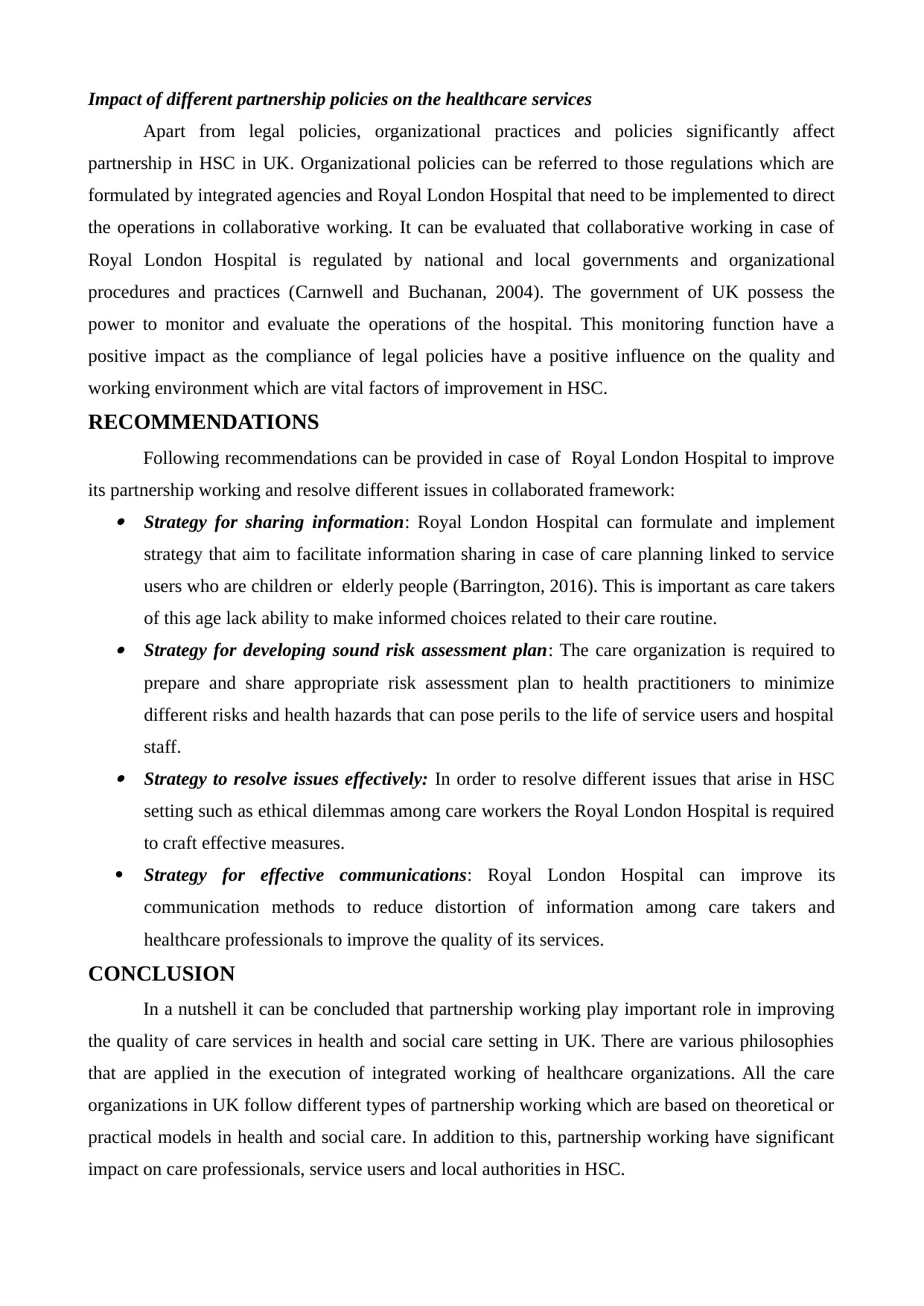
Impact of different partnership policies on the healthcare services
Apart from legal policies, organizational practices and policies significantly affect
partnership in HSC in UK. Organizational policies can be referred to those regulations which are
formulated by integrated agencies and Royal London Hospital that need to be implemented to direct
the operations in collaborative working. It can be evaluated that collaborative working in case of
Royal London Hospital is regulated by national and local governments and organizational
procedures and practices (Carnwell and Buchanan, 2004). The government of UK possess the
power to monitor and evaluate the operations of the hospital. This monitoring function have a
positive impact as the compliance of legal policies have a positive influence on the quality and
working environment which are vital factors of improvement in HSC.
RECOMMENDATIONS
Following recommendations can be provided in case of Royal London Hospital to improve
its partnership working and resolve different issues in collaborated framework: Strategy for sharing information: Royal London Hospital can formulate and implement
strategy that aim to facilitate information sharing in case of care planning linked to service
users who are children or elderly people (Barrington, 2016). This is important as care takers
of this age lack ability to make informed choices related to their care routine. Strategy for developing sound risk assessment plan: The care organization is required to
prepare and share appropriate risk assessment plan to health practitioners to minimize
different risks and health hazards that can pose perils to the life of service users and hospital
staff. Strategy to resolve issues effectively: In order to resolve different issues that arise in HSC
setting such as ethical dilemmas among care workers the Royal London Hospital is required
to craft effective measures.
Strategy for effective communications: Royal London Hospital can improve its
communication methods to reduce distortion of information among care takers and
healthcare professionals to improve the quality of its services.
CONCLUSION
In a nutshell it can be concluded that partnership working play important role in improving
the quality of care services in health and social care setting in UK. There are various philosophies
that are applied in the execution of integrated working of healthcare organizations. All the care
organizations in UK follow different types of partnership working which are based on theoretical or
practical models in health and social care. In addition to this, partnership working have significant
impact on care professionals, service users and local authorities in HSC.
Apart from legal policies, organizational practices and policies significantly affect
partnership in HSC in UK. Organizational policies can be referred to those regulations which are
formulated by integrated agencies and Royal London Hospital that need to be implemented to direct
the operations in collaborative working. It can be evaluated that collaborative working in case of
Royal London Hospital is regulated by national and local governments and organizational
procedures and practices (Carnwell and Buchanan, 2004). The government of UK possess the
power to monitor and evaluate the operations of the hospital. This monitoring function have a
positive impact as the compliance of legal policies have a positive influence on the quality and
working environment which are vital factors of improvement in HSC.
RECOMMENDATIONS
Following recommendations can be provided in case of Royal London Hospital to improve
its partnership working and resolve different issues in collaborated framework: Strategy for sharing information: Royal London Hospital can formulate and implement
strategy that aim to facilitate information sharing in case of care planning linked to service
users who are children or elderly people (Barrington, 2016). This is important as care takers
of this age lack ability to make informed choices related to their care routine. Strategy for developing sound risk assessment plan: The care organization is required to
prepare and share appropriate risk assessment plan to health practitioners to minimize
different risks and health hazards that can pose perils to the life of service users and hospital
staff. Strategy to resolve issues effectively: In order to resolve different issues that arise in HSC
setting such as ethical dilemmas among care workers the Royal London Hospital is required
to craft effective measures.
Strategy for effective communications: Royal London Hospital can improve its
communication methods to reduce distortion of information among care takers and
healthcare professionals to improve the quality of its services.
CONCLUSION
In a nutshell it can be concluded that partnership working play important role in improving
the quality of care services in health and social care setting in UK. There are various philosophies
that are applied in the execution of integrated working of healthcare organizations. All the care
organizations in UK follow different types of partnership working which are based on theoretical or
practical models in health and social care. In addition to this, partnership working have significant
impact on care professionals, service users and local authorities in HSC.
⊘ This is a preview!⊘
Do you want full access?
Subscribe today to unlock all pages.

Trusted by 1+ million students worldwide
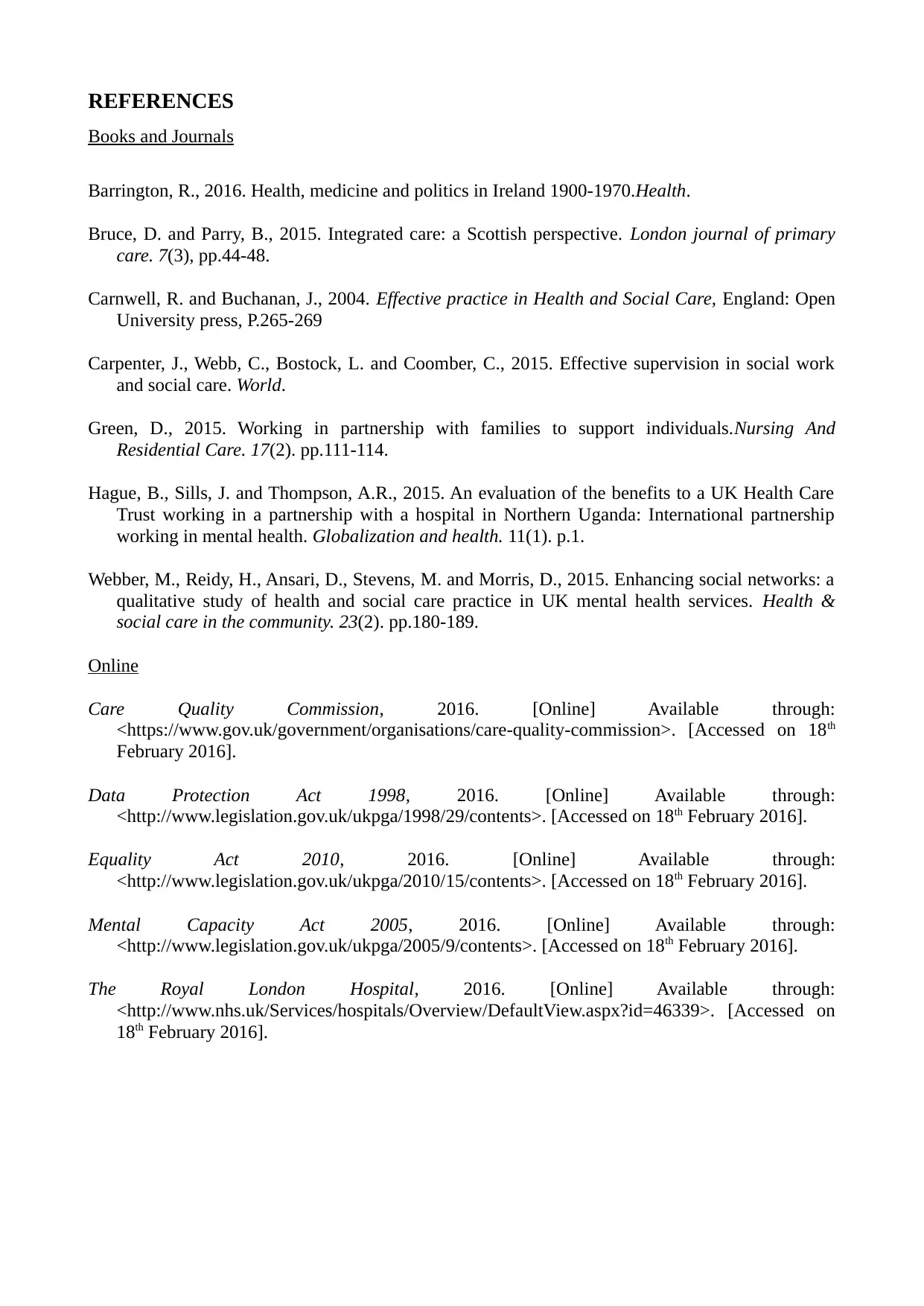
REFERENCES
Books and Journals
Barrington, R., 2016. Health, medicine and politics in Ireland 1900-1970.Health.
Bruce, D. and Parry, B., 2015. Integrated care: a Scottish perspective. London journal of primary
care. 7(3), pp.44-48.
Carnwell, R. and Buchanan, J., 2004. Effective practice in Health and Social Care, England: Open
University press, P.265-269
Carpenter, J., Webb, C., Bostock, L. and Coomber, C., 2015. Effective supervision in social work
and social care. World.
Green, D., 2015. Working in partnership with families to support individuals.Nursing And
Residential Care. 17(2). pp.111-114.
Hague, B., Sills, J. and Thompson, A.R., 2015. An evaluation of the benefits to a UK Health Care
Trust working in a partnership with a hospital in Northern Uganda: International partnership
working in mental health. Globalization and health. 11(1). p.1.
Webber, M., Reidy, H., Ansari, D., Stevens, M. and Morris, D., 2015. Enhancing social networks: a
qualitative study of health and social care practice in UK mental health services. Health &
social care in the community. 23(2). pp.180-189.
Online
Care Quality Commission, 2016. [Online] Available through:
<https://www.gov.uk/government/organisations/care-quality-commission>. [Accessed on 18th
February 2016].
Data Protection Act 1998, 2016. [Online] Available through:
<http://www.legislation.gov.uk/ukpga/1998/29/contents>. [Accessed on 18th February 2016].
Equality Act 2010, 2016. [Online] Available through:
<http://www.legislation.gov.uk/ukpga/2010/15/contents>. [Accessed on 18th February 2016].
Mental Capacity Act 2005, 2016. [Online] Available through:
<http://www.legislation.gov.uk/ukpga/2005/9/contents>. [Accessed on 18th February 2016].
The Royal London Hospital, 2016. [Online] Available through:
<http://www.nhs.uk/Services/hospitals/Overview/DefaultView.aspx?id=46339>. [Accessed on
18th February 2016].
Books and Journals
Barrington, R., 2016. Health, medicine and politics in Ireland 1900-1970.Health.
Bruce, D. and Parry, B., 2015. Integrated care: a Scottish perspective. London journal of primary
care. 7(3), pp.44-48.
Carnwell, R. and Buchanan, J., 2004. Effective practice in Health and Social Care, England: Open
University press, P.265-269
Carpenter, J., Webb, C., Bostock, L. and Coomber, C., 2015. Effective supervision in social work
and social care. World.
Green, D., 2015. Working in partnership with families to support individuals.Nursing And
Residential Care. 17(2). pp.111-114.
Hague, B., Sills, J. and Thompson, A.R., 2015. An evaluation of the benefits to a UK Health Care
Trust working in a partnership with a hospital in Northern Uganda: International partnership
working in mental health. Globalization and health. 11(1). p.1.
Webber, M., Reidy, H., Ansari, D., Stevens, M. and Morris, D., 2015. Enhancing social networks: a
qualitative study of health and social care practice in UK mental health services. Health &
social care in the community. 23(2). pp.180-189.
Online
Care Quality Commission, 2016. [Online] Available through:
<https://www.gov.uk/government/organisations/care-quality-commission>. [Accessed on 18th
February 2016].
Data Protection Act 1998, 2016. [Online] Available through:
<http://www.legislation.gov.uk/ukpga/1998/29/contents>. [Accessed on 18th February 2016].
Equality Act 2010, 2016. [Online] Available through:
<http://www.legislation.gov.uk/ukpga/2010/15/contents>. [Accessed on 18th February 2016].
Mental Capacity Act 2005, 2016. [Online] Available through:
<http://www.legislation.gov.uk/ukpga/2005/9/contents>. [Accessed on 18th February 2016].
The Royal London Hospital, 2016. [Online] Available through:
<http://www.nhs.uk/Services/hospitals/Overview/DefaultView.aspx?id=46339>. [Accessed on
18th February 2016].
1 out of 7
Related Documents
Your All-in-One AI-Powered Toolkit for Academic Success.
+13062052269
info@desklib.com
Available 24*7 on WhatsApp / Email
![[object Object]](/_next/static/media/star-bottom.7253800d.svg)
Unlock your academic potential
Copyright © 2020–2026 A2Z Services. All Rights Reserved. Developed and managed by ZUCOL.





